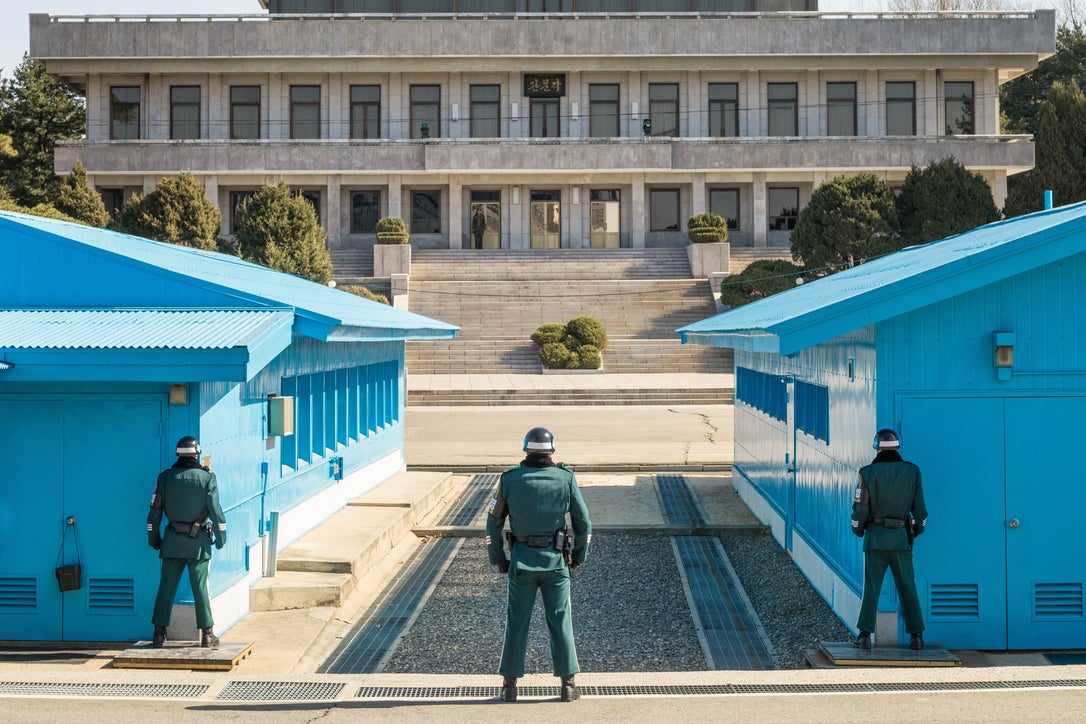North Korea: Why trips are continuing despite the escalating tension
This week the Foreign Office warned against all but essential travel to Kim Jong-un’s nuclear-equipped prison camp

In common with thousands of other people, I have visited North Korea – but only for a few seconds.
A popular excursion from the South Korean capital, Seoul, is into the world’s most militarised zone: the “Demilitarized Zone”, or DMZ, where the two Koreas square up against each other.
Taking part is slightly trickier than an average day trip: you submit your passport details four days ahead and pay the equivalent of £55. On the day, there is an “attire check” to ensure you don’t look too decadent (no ripped jeans, biker leathers or sandals), and you must sign a waiver accepting the risk of “injury or death as a direct result of enemy action”.
The destination is the Joint Security Area, located in what remains of the village of Panmunjom. It was here that the ceasefire ending the Korean War in 1953 was signed. Today, occasional talks between the two sides are still held in a conference room – painted United Nations blue – but for most of the time it serves as a tourist attraction.
It has a door at each end, one for each half of the divided nation. Inside, elite soldiers from either side, chosen for their hostile demeanour, guard the table at the centre. As a tourist, you can walk right around it, briefly trespassing on North Korean territory.
Visitors from the North can do the same thing as part of a tightly controlled tour of the Democratic People’s Republic of Korea, taking in other attractions such as the Tae’an Heavy Machine Tool Complex.
Lonely Planet co-founder Tony Wheeler has visited the hut from both sides. “On the South side we drove up a motorway that could have been the M25 on a not-so-bad day,” he recalls. “On the North side we drove down a totally empty motorway.”
There could soon be even fewer tourists arriving from the North. A year ago, the government in Pyongyang said: “The situation on the Korean Peninsula is so tense that a nuclear war may break out any moment.” And this week the Foreign Office suddenly warned against all but essential travel to Kim Jong-un’s nuclear-equipped prison camp.
“While daily life in the capital city Pyongyang may appear calm,” the updated advice says, “The security situation in North Korea can change with little notice and with no advance warning of possible actions by the North Korean authorities. This poses significant risks to British visitors and residents.”
The effect of the ban is to trigger the cancellation of planned trips by UK tour operators. But Simon Cockerell, general manager of Koryo Tours, is still keen to encourage visitors. His firm, based in Beijing, has been running trips to North Korea since 1989.
Business, he concedes, is not exactly, er, booming: “The increased rhetoric of two sides waving missiles and threats of annihilation at each other has combined to push things down somewhat these days."
Even so, he says, tours are carrying on despite all the drama; for those who like doing extreme things in extreme places, the Pyongyang Marathon in April saw record numbers of Western participants.
“We have always advised all of our visitors to read various travel advisories and warnings, and to take them into account and to then make an informed decision,” says Cockerell. “We aren’t interested in being reckless."
The reward? “It’s not just going and gawping at something unusual, it’s about experiencing as much as one can even with all the barriers in place. If you are curious, have realistic expectations of what you want to see and do, are willing to accept frustrations, limitations and regulations, and are someone who understands that scratching the surface of the place is all one can do in a short visit, then we welcome you.”
You might be thinking, “He would say that, wouldn’t he?” Yet no doubt a trickle of curious visitors will continue – which could bring benefits. If North Koreans learn that not everyone is out to get them, hostility may soften. Travel should benefit tourists and the host. In the context of North Korea, I hope it is not excessively naive to think it might also help the world.
Join our commenting forum
Join thought-provoking conversations, follow other Independent readers and see their replies
Comments
Bookmark popover
Removed from bookmarks